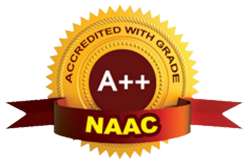The Bachelor of Science Honours in Anthropology (BSCANH) is a broad based programme with a mix of disciplinary, interdisciplinary and skill-based courses. It is designed to provide the learners with the information and skills necessary to understand and analyse their world by introducing them to the main themes and topics not only in Anthropology but disciplines like Humanities, Social Sciences and Sciences .
Programme Structure
The Bachelor of Science Honours in Anthropology (BSCANH) is of 148 credits with a mix of five types of courses: fourteen a) Core Courses, four b) Discipline Specific Electives, two c) Ability Enhancement Compulsory Courses, two d) Skill Enhancement Courses and two e) Generic Electives. While each of the Ability and Skill Enhancement is of four credit weightage, all other courses of this programme are six credit courses.
Eligibility
The University admits students to its Bachelors programmes from both formal and non-formal scheme. The non-formal stream consists of those students who have not cleared 10+2 or equivalent exam. To take admission to IGNOU’s degree programme they have to pass its Bachelor’s Preparatory Programme (BPP) first.
There is no entrance test for seeking admission.
Medium of Instruction
The B.Sc. Honours programme is on offered in English and Hindi. The student has to opt for a particular medium of study while applying for admission to the programme.
Duration
The programme can be completed by earning the required number of credits under each category in a minimum period of three years (six semesters) or in the maximum period of six years.
Fee Structure: A total of ?15,600/- to be paid year wise @ ?5200/-, /- per year, along with a
Registration fee of ?. 200/- in the first year. The Programme fee has to be paid via Debit/Credit Card through online mode only. Fees once paid is not refundable.
Courses for the Programme
Interactive Radio Counselling
The University has the facility of interactive counselling through All India Radio network all over India. You can participate in it by tuning in to your area Radio station. Experts from various discipline areas are available for this counselling. Students can use the telephone to put across their questions to these experts. The telephone numbers are announced by the respective Radio Stations. This counselling is available on all days. The topic for each session of the interactive radio programme is available in the Gyanvani section of the University website.
Gyan Darshan
IGNOU in collaboration with Doordarshan now has an exclusive Educational TV Channel called Gyan Darshan. It is available through cable TV network. The channel telecasts educational programmes for 24 hours every day. It has Live and repeat telecasts of IGNOU programmes as well as educational programmes produced by various national education institutions. The schedule of programmes and live sessions is available on the University website
GyanVani
Gyan Vani is an educational FM Radio network providing programmes covering different aspects and levels of education including Primary and Secondary Education, Adult Education, Technical and Vocational Education, Higher Education and Extension Education. There will be programmes on various aspects and courses of the Honours programme in Political Science. The schedule of the programmes is available on the University website.
Teleconference/EDUSAT
Teleconferencing sessions are conducted from Delhi. Learners can attend these at their regional centres and specified study centres of IGNOU. It is a one way video and two way audio facility. The teleconferencingisavailableonGyanDarshan-2andEdusat. The faculty members at Delhi and other experts as resource persons participate in these sessions. You can put your problems and questions to these experts through the telephone available at receiving centres. These will help in resolving your queries related to courses and other general information pertaining to the programme.
Attendance
If a course has practical component, students are required to complete ninety percent attendance in practical contact sessions to become eligible for appearing in practical examination.
Continuous Evaluation of Theory Component
Assignments
Assignment is a means of continuing assessment of theory and practical. Each assignment consists of a set of questions and/or activities that you will answer/do at your own place by referring your blocks. The assignments will cover all types of questions (long answer type, short answer type, objective type, multiple choice questions and case studies).
The assignments will carry thirty percent weightage. Students will be required to obtain fifty percent marks as pass percentage in each assignment separately. The number of assignments varies from two to three depending on the credit weightage of the course. The assignments of each course carry 100 marks. In the final result, assignments will carry thirty percent weightage.
Term-end Examination
The University conducts term end examinations twice a year i.e., in June and December. However, you can take the examination only after completing one year of study. This means that the Term End Examination (TEE) for first and second semesters would be conducted together at the end of first year. Similarly, TEE for third and fourth semesters and for the fifth and sixth semesters will be conducted together at the end of the Second and Third year of the programme. If youmisstakinganyexamination at the end of the year, you may take those courses in next TEE conducted in June or December.



